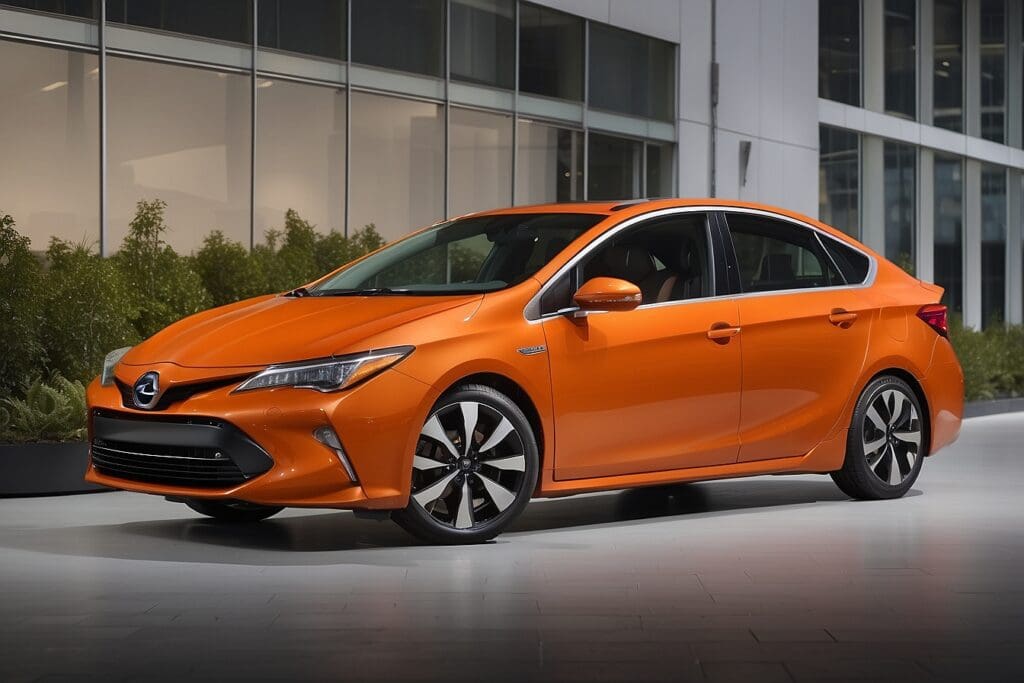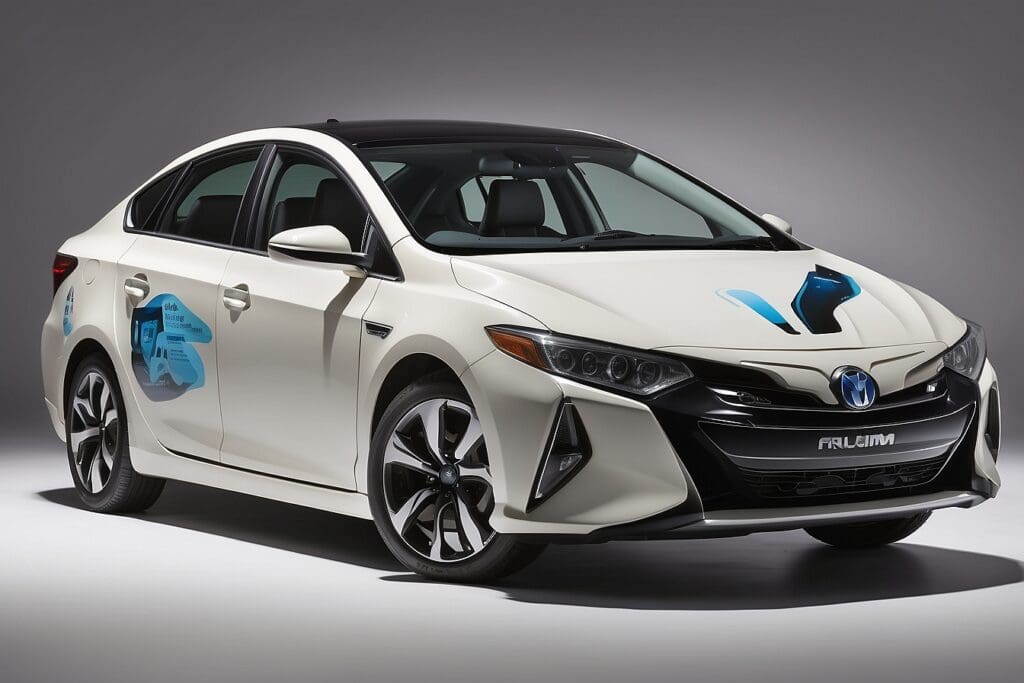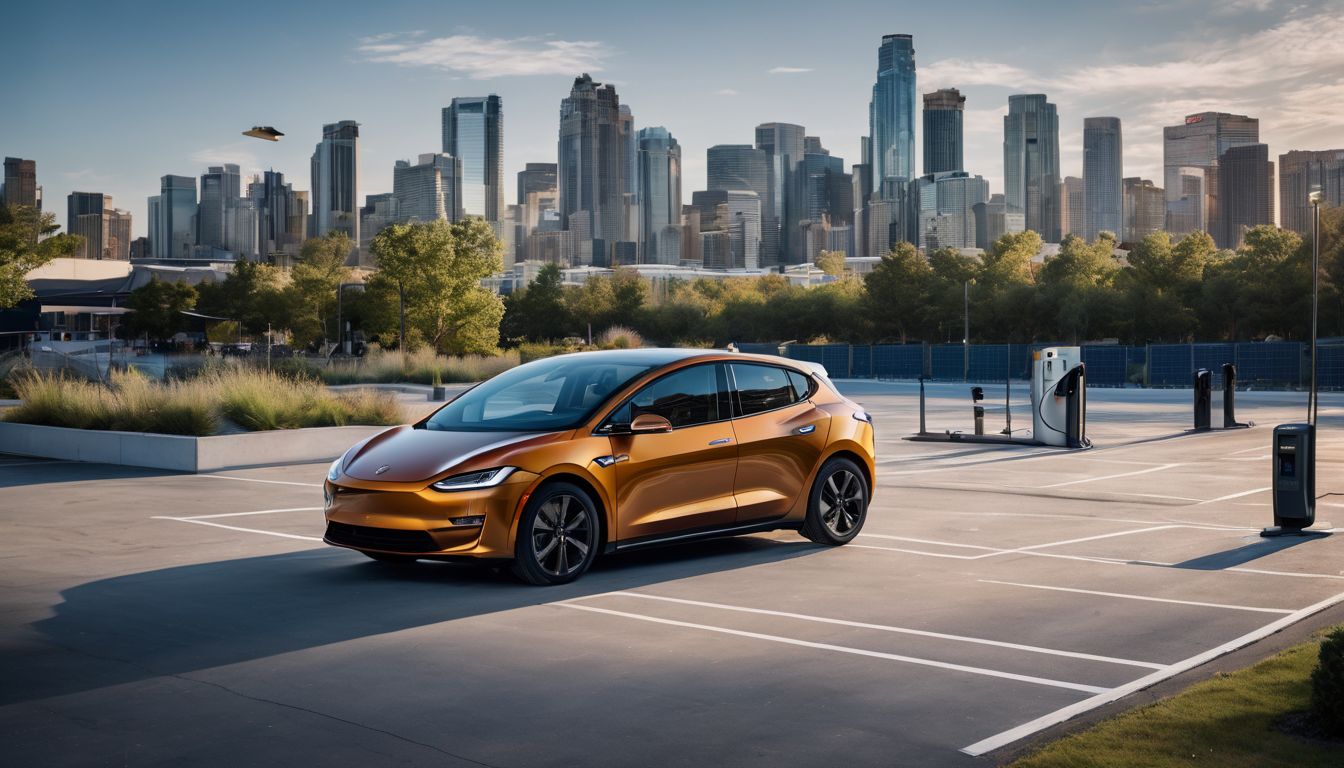We all have a shared responsibility to tread lightly on our beautiful planet, and let’s be honest, our love affair with cars does pose quite the environmental pickle. Just like you, I’m truly invested in unearthing ways to navigate our lives with a more tender touch on Mother Earth; particularly since road transport is responsible for a rather hefty slice—over 10%—of global greenhouse gas emissions.
It’s clear as day that we need better options.
In delving into the world of hybrid vehicles, we’ve stumbled upon what might just be a beacon of hope—a real game-changer for reducing our carbon footprints without putting the brakes on our need to get about.
Stick with us as we unpack this further – it could very well steer your future decisions towards a greener horizon.
Key Takeaways
- Hybrid cars combine a traditional engine with an electric motor to cut down on fuel use and decrease emissions.
- They include features like regenerative braking to recover energy, which improves overall efficiency and reduces reliance on fossil fuels.
- The rise of hybrid vehicles shows that more people are choosing eco – friendly options for driving, contributing to lower carbon emissions.
- Technological advances in hybrids are constantly being made, boosting their performance and making them even better for the environment.
- By opting for hybrid cars over conventional ones, drivers can play a crucial part in tackling climate change and promoting sustainable transport.
Understanding Hybrid Cars

Hybrid cars are vehicles that utilise both a combustion engine and an electric motor to operate. They switch between the two power sources to optimise fuel efficiency and reduce emissions.
What are hybrid cars?
Hybrid cars are vehicles that combine a conventional combustion engine with an electric motor to power the car. They use less petrol and produce fewer tailpipe emissions than standard cars, helping us make strides towards low-emission transportation.
These eco-friendly vehicles save on fuel and cut back on greenhouse gases, creating a smaller environmental impact every time we hit the road.
The magic of hybrids lies in their ability to switch between or combine energies from both sources. This means they use renewable energy whenever possible and only revert to fossil fuels when necessary.
As a result, we see significant improvements in fuel efficiency and a reduction in carbon emissions compared to traditional petrol or diesel-powered cars. Driving a hybrid is one way we can contribute to sustainable transportation while still enjoying the freedom of the open road without range anxiety.
How do hybrid cars operate?
Hybrid cars operate by combining an internal combustion engine with an electric motor. The vehicle uses the electric motor at low speeds and during acceleration, while the gasoline engine kicks in when more power is needed or at higher speeds.
This dual-power system allows hybrids to achieve better fuel economy and lower emissions compared to traditional vehicles, making them a more environmentally friendly alternative.
Additionally, regenerative braking enables hybrid cars to recharge their batteries while slowing down or coming to a stop. This boosts energy efficiency and reduces reliance on fossil fuels, contributing to a decrease in carbon emissions from transportation.
Through this innovative technology, hybrid cars play a crucial role in promoting clean transportation and reducing our carbon footprint.
The Benefits of Hybrid Cars
Hybrid cars offer lower emissions and improved fuel economy, making them an eco-friendly choice for environmentally conscious individuals. With reduced reliance on fossil fuels, hybrid cars play a crucial role in reducing carbon footprint and promoting a sustainable future.
Lower emissions
Hybrid vehicles emit fewer harmful gases. These cars produce lower levels of carbon dioxide and other pollutants, helping to decrease overall greenhouse gas emissions. By using a combination of electric power and traditional fuel, hybrids play a significant role in reducing environmental impact.
The integration of cutting-edge technology in hybrid vehicles results in reduced emissions, contributing to cleaner air and addressing the growing concern over climate change. These eco-friendly cars are essential for environmentally conscious individuals who support conservation efforts.
Improved fuel economy
Hybrid cars offer improved fuel economy compared to traditional petrol-powered vehicles. This is achieved through a combination of an internal combustion engine and an electric motor, which work together to optimise fuel consumption.
The electric motor assists the engine during acceleration, reducing the reliance on petrol or diesel power alone. As a result, hybrids can achieve higher miles per gallon (mpg) and reduce overall fuel costs for drivers.
The shift towards hybrid technology aligns with the global push for eco-friendly transportation solutions and offers a practical way for individuals to lower their carbon footprint.
The integration of regenerative braking systems in hybrid cars also contributes to improved fuel economy by capturing kinetic energy during braking and converting it into electricity.
Reduced reliance on fossil fuels
Reducing our dependence on fossil fuels is a crucial step towards mitigating climate change and preserving the environment. Electric vehicles, which include hybrid cars, play a significant role in achieving this goal.
By combining an electric motor with a conventional engine, hybrids consume less petrol or diesel compared to traditional vehicles. This leads to decreased demand for fossil fuels and subsequently reduces carbon emissions, contributing to cleaner air and a healthier planet.
The adoption of alternative fuels in hybrid cars marks a positive shift towards sustainable transportation. Utilising innovative technologies such as regenerative braking and automatic start-stop systems further enhances fuel efficiency while minimising reliance on non-renewable resources.
The Future of Hybrids
Hybrid vehicles have seen significant growth in recent years, and advancements in technology continue to improve their efficiency and performance. As the automotive industry continues to prioritise sustainability, hybrid cars are expected to play a crucial role in reducing carbon footprint and promoting eco-friendly transportation options.
The growth of hybrid vehicles
Hybrid vehicles are becoming increasingly popular worldwide. Car manufacturers continue to invest in hybrid technology, making these vehicles more accessible and appealing. Their popularity is evident in the growing number of hybrid models available from various automakers.
- The expansion of hybrid options makes it easier for consumers to choose fuel – efficient cars.
- More people are realising the benefits of eco-friendly vehicles and are opting for low-emission hybrids.
- The increasing availability of hybrid options contributes to the shift towards green transportation.
- As more hybrid vehicles hit the roads, there is a significant reduction in carbon emissions.
Advancements in hybrid technology

Car manufacturers continue to make significant strides in hybrid technology, leading to more efficient and eco-friendly vehicles. Engineers are constantly improving the energy storage systems in hybrids by developing advanced battery technologies.
These advancements allow hybrid cars to store more energy and operate for longer periods solely on electric power, reducing overall fuel consumption and emissions. Additionally, ongoing research in lightweight materials and aerodynamics has resulted in sleeker, more aerodynamic designs that help improve fuel efficiency further while reducing carbon emissions from these vehicles.
Furthermore, advancements in regenerative braking systems enable hybrids to capture lost energy during braking and convert it into electricity to recharge the batteries. This innovation enhances overall fuel economy by making better use of kinetic energy that would otherwise go to waste.
The role of hybrid cars in reducing carbon footprint
Advancements in hybrid technology have led to a significant reduction in carbon emissions, making hybrid cars pivotal in our efforts to combat climate change. By combining an internal combustion engine with an electric motor, hybrid cars achieve higher fuel efficiency and produce fewer harmful emissions than traditional vehicles.
This results in a substantial decrease in overall carbon footprint, contributing positively to environmental conservation.
Hybrid vehicles play a crucial role in reducing carbon footprint by promoting the use of eco-friendly transportation. As environmentally conscious individuals supporting conservation and environmental, it is important to consider the impact of our vehicle choices on the environment.
Conclusion
Hybrid cars play a significant role in reducing carbon footprint. They emit lower levels of harmful gases, such as carbon monoxide and nitrogen oxide. Hybrid vehicles contribute to less air pollution and help combat climate change.
By choosing hybrids, we are actively supporting the effort to create a healthier environment for future generations.
FAQs
1. What role do hybrid cars play in reducing carbon emissions?
Hybrid cars play a significant role in reducing carbon emissions because they are fuel-efficient and produce lower emissions than traditional petrol or diesel vehicles.
2. Are all hybrids considered eco-friendly vehicles?
Yes, hybrids are designed to be eco-friendly as they use a combination of electricity and fuel, leading to less pollution and a smaller carbon footprint.
3. Can switching to low-emission vehicles make a big difference for the environment?
Definitely! Switching to low-emission vehicles like hybrids cuts down on harmful pollutants and helps fight climate change by reducing your personal carbon footprint.
4. How do fuel-efficient cars help with carbon emissions reduction?
Fuel-efficient cars, such as hybrids, require less petrol or diesel per mile travelled, which means burning fewer fossil fuels and releasing fewer greenhouse gases into the atmosphere.





